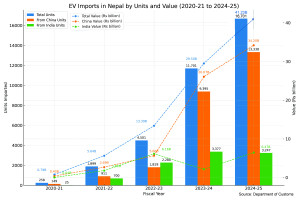Money
Organic fertiliser plant launched in Palpa to combat soil degradation
In response to declining agricultural yields and worsening soil conditions caused by excessive chemical fertiliser use, the plant offers farmers a sustainable alternative to restore soil fertility.
Madhav Aryal
In an effort to recover worsening soil health caused by excessive use of chemical fertilisers, a new organic fertiliser factory has begun production and sales in Kusumkhola, Ribdikot Rural Municipality, Palpa.
The plant, developed under a public-private partnership, was established in collaboration between the rural municipality, the Jalpeswar Multipurpose Cooperative, and local farmers. The initiative aims to offer a sustainable alternative to chemical fertilisers, which have increased soil acidity and declined crop yields in the region.
The cooperative leased land from the Jalpeswar temple to build the factory infrastructure. The organic fertiliser, branded Amritbuti Jaibik Mal, is priced at Rs25 per kilogram, although it was sold at a discounted rate of Rs20 per kilogram as an inaugural offer.
The factory was officially inaugurated by Lumbini Province Assembly Speaker and local representative Tularam Gharti (Basanta). He said the initiative was included in the rural municipality’s policy last fiscal year and that the provincial government has prioritised the issue again this year.
“With a daily production capacity ranging from 500 to 1,000 kilograms, this project is a commendable step for a rural area,” Gharti said. “It also highlights the effectiveness of collaboration between the provincial government and the local body. Public participation in organic farming is crucial.”
Rural Municipality chair Narayan Bahadur Karki said that the project was launched in response to farmers' concerns that their hard work had not been adequately paying off. “We decided to partner with the cooperative to tackle declining productivity. While the initial investment is modest, there is great potential for future expansion,” he said.
The rural municipality invested Rs1.9 million while the cooperative contributed Rs2 million to start fertiliser production. The estimated setup cost is Rs4.5 million.
The cooperative has leased three ropanis (approximately 0.15 hectares) of land—one ropani for the factory and the remainder for livestock and additional farming operations.
According to cooperative chair Shiv Kunwar, the municipality’s grant was provided in two tranches.
Soil and fertiliser tests conducted by the provincial laboratory in Khajura, Banke, revealed that most of Ribdikot’s soil is acidic, with some areas registering as alkaline.
Agricultural expert Yam Bahadur Darlami said the unchecked use of chemical fertilisers and pesticides has severely impacted soil health. Small-scale organic fertiliser plants like this one, he said, offer a viable solution to soil damage.
“These fertilisers can help reverse the degradation seen in recent years, which has directly impacted crop productivity,” he said.
Amritbuti Jaibik Mal is produced using local and invasive herbs like banmara (Eupatorium), titepati (mugwort), and other wild hill weeds. The formula includes bone meal, molasses, bio-bacteria, pseudomonas, trichoderma, seaweed, calcium, cow dung, and press mud.
The fertiliser contains 1 percent nitrogen, 0.5 percent phosphorus, 1 percent potassium, 25 percent moisture, and a neutral pH of 7. It can be stored for up to two years from the date of packaging.
Farmer Goma Thapa from Kusumkhola said that in certain parts of the hilly district, even weeds struggle to grow due to the heavy reliance on chemical fertilisers. “This has made farming extremely difficult. We hope organic alternatives can help bring the soil back to life,” she said.
Ribdikot’s areas, such as Palungmainadi, Kusumkhola, Thimure, and Khasyauli, are key hubs for commercial vegetable and fruit cultivation. However, many farmers have reduced cultivation or abandoned farming due to poor yields. Soil tests revealed a sharp decline in fertility, with some areas showing pH levels as low as 4.5, well below the ideal pH of 8 for hill agriculture.
In response to widespread farmer complaints, the rural municipality has conducted soil tests across its wards. Many farmers, previously unaware of their soil’s condition, have now received guidance through soil testing camps, helping them choose more suitable crops for their land.
Lila Bahadur Karki, executive director of the Rural Economic Development Association (REDA), said the organisation is working with the municipality on an agricultural improvement project to prevent soil degradation and promote organic fertiliser use. “We believe increased adoption of organic fertilisers can gradually improve productivity and soil health,” he said.
Experts have also raised concerns about the broader implications of chemical fertiliser overuse, warning that it not only degrades soil but also poses risks to human health. A soil pH below 6.5 indicates acidity, 7.5 is neutral, and above is alkaline. Most Ribdikot samples have shown low nitrogen, phosphorus, and potassium levels—key nutrients required for plant growth.
Despite these challenges, Ribdikot remains a major producer of crops such as Akabare chillies, oranges, ginger, turmeric, and vegetables. The region produces Akabare chillies worth Rs50 million, oranges worth Rs70 million, and vegetables valued at over Rs20 million annually.
However, the use of chemical pesticides and fertilisers has been rampant in nearly all farming communities in the district. Many vegetables now are laced with high pesticide residues, most of which go untested, increasing the risk to consumers.
While local organisations and agriculture offices used to distribute materials and training for producing organic pesticides, these programmes have ceased since 2017.
Farmer Human Singh Karki emphasised the need for large-scale production of homemade organic fertilisers to reverse the trend of soil degradation. “If we’re serious about restoring soil health, we must scale up these efforts. The solution lies in sustainable, locally produced alternatives—not imported chemicals,” he said.




 22.85°C Kathmandu
22.85°C Kathmandu

















